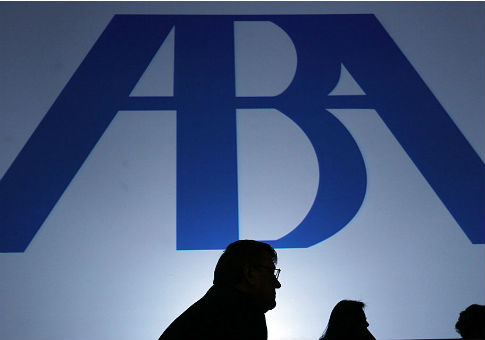The American Bar Association's policy-making body on Tuesday approved a resolution supporting a ban on mandatory minimum sentencing.
The ABA's House of Delegates adopted resolution 10B, which opposes the use of mandatory minimums in any criminal case, the ABA Journal reports.
The resolution also calls on Congress and state legislatures to repeal mandatory minimums, and not to enact further minimums into law.
Mandatory minimums are legislatively set standards that require a minimum sentence for some crime, or for an aggravating factor in a crime. A report by the United States Sentencing Commission argued that such laws have been in continuous use since 1790. However, they are often fingered as key culprits in the U.S.'s comparatively high rates of incarceration, and in instances of obviously disproportionate sentences.
As much is pointed out by the report that accompanied the initially proposed resolution, which notes that "the United States imprisons its citizens at a rate roughly five to eight times higher than the countries of Western Europe and 12 times higher than Japan." The report also claims a connection because, "[i]n the 25 years since the advent of the mandatory minimum sentences for drug offenses and the adoption of the Sentencing Guidelines, the average federal sentence has tripled in length."
The report also notes the ABA's history of opposition to mandatory minimums.
"The ABA has opposed mandatory minimum sentencing—which it believes raises grave issues of public policy—for almost fifty years," it reads.
The final resolution, 10B, was a revised version of resolution 10A, amending the latter to remove wording that urged the Justice Department to rescind a policy promulgated under Attorney General Jeff Sessions, who instructed federal prosecutors to "charge and pursue the most serious, readily provable offense." Sessions' policy overturned a previous order by Obama administration Attorney General Eric Holder, who gave U.S. attorneys some discretion in charging non-violent drug offenders.
The call for Sessions to rescind his memo was removed after the Justice Department, which has as seat in the ABA's Criminal Justice Section, voiced objections on Monday, saying that it believed there were errors in the report.
"The draconian charging and sentencing policies urged by Sessions are a throwback to the policies of limited prosecutorial discretion and increased mandatory minimum sentences—policies that did not work—and are in stark contrast to the progressive trend in policies over the last 10 years," the report says.
The ABA's resolution received pushback from proponents of tough-on-crime sentencing. William Otis, a professor at Georgetown Law and former special counsel to George H.W. Bush, attacked the resolution on his blog.
"The belief that Congress ought to be able to set a rock bottom minimum for serious offenses — an idea taking root in the same uncontroversial notion that it can set a binding-on-judges maximum — evidently never occurs to the ABA," Otis wrote. "The organization understandably cites no precedent in two centuries of case law for its proposal that sentencing courts should have 100% discretion 100% of the time, and Congress can go sit in the corner."
